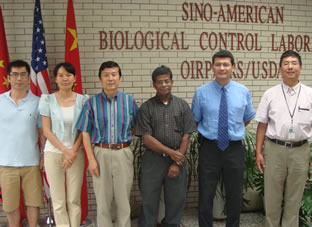UTSA scholar Janakiram Seshu leads USDA research team to China

The research team visits the Sino-American Biological Control Laboratory in Beijing, China. Pictured are U.S. team members Janakiram Seshu, Adalberto Pérez de León and Andrew Li (third, second and first from the right) with scientists from the Sino-American Biological Control Laboratory.

The research team visits the Sino-American Biological Control Laboratory in Beijing, China. Pictured are U.S. team members Janakiram Seshu, Adalberto Pérez de León and Andrew Li (third, second and first from the right) with scientists from the Sino-American Biological Control Laboratory.
(Dec. 19, 2012) -- Janakiram Seshu, associate professor of bacterial pathogenesis in the UTSA Department of Biology and a member of the South Texas Center for Emerging Infectious Diseases (STCEID), recently led a three-member team of investigators to China to launch research collaborations related to tick-borne diseases.
The other members of the traveling team included Adalberto Pérez de León, director, and Andrew Li, research physiologist of the U.S. Department of Agriculture Knipling-Bushland U.S. Livestock Insects Research Laboratory in Kerrville, Texas.
The team visited six Chinese institutions including the Chinese Center for Disease Control and Prevention in Beijing. The two-week trip was funded by the USDA Scientific Cooperation Exchange Program (SCEP) and the Ministry of Agriculture of the People's Republic of China.
The goal of the visit was to establish links with potential long-term collaborators at Chinese institutions for scientific and technological exchange, ultimately to mitigate the impact of tick-borne diseases. One research staff member and one student from two different institutions in China are expected to soon visit UTSA and the USDA-ARS facility in Kerrville as part of the scientific exchange program.
Seshu's research focuses on Lyme disease, the most-prevalent tick-borne infectious disease in the United States. His laboratory is examining regulation of gene expression affecting the survival and infectious capabilities of Borrelia burgdorferi, the agent that causes the disease. As a member of the Center of Excellence in Infection Genomics at UTSA, Seshu and his research team uses several novel methodologies to determine how the agent of Lyme disease is transmitted to animals bitten by infected ticks and aims to identify methods to prevent the transmission and onset of the disease in humans.
The UTSA Center for Infection Genomics is funded by the U.S. Department of Defense. The research center focuses on four core areas of expertise: the genomics of intestinal and respiratory pathogens, the biochemistry and molecular biology of vector-borne pathogens, the immunopathogenesis of fungal infections and anti-fungal drug development, and vaccine development.
Learn more at the UTSA Center of Excellence in Infection Genomics website.
Events
The UTSA Office of Undergraduate is proud to celebrate National Undergraduate Research with an annual event sponsored by the (OUR) featuring students will showcase undergraduate student research and creative endeavors from all disciplines across campus.
Various LocationsDía en la Sombrilla, formerly Fiesta UTSA, is a festival hosted each spring as a part of Fiesta® San Antonio events. Sponsored by Roadrunner Productions, the event features music, food, confetti, games, event t-shirts, and more.
Sombrilla Plaza and Central Plaza, Main CampusFiesta Arts Fair features contemporary art from more than 100 artists from across the U.S., Fiesta favorite foods, drinks, live music by local and regional performers, and a Young Artists Garden providing opportunities for budding artists to learn, explore and express their creativity.
UTSA Southwest CampusJoin the PEACE Center and Wellbeing Services for Denim Day, a day of learning about the importance of consent and why we wear denim on the last Wednesday of the month each April during Sexual Assault Awareness Month. Stop by our Denim Day display to take a photo in front of our Denim Wall, spin the "Is It Consent?" Wheel, and get a Concha or goodie.
Student Union Window Lounge, Main CampusLearn to use Zotero®, a citation manager that can help you store and organize citations you find during your research. Zotero can generate bibliographies in various styles, insert in-text citations and allow you to share sources with collaborators.
Virtual EventThis event is to achnowlege the graduating seniors and induct the new cohart of scholars to our program.
North Paseo Building (NPB 5.140,) Main CampusCelebrate the accomplishments of College of Education and Human Development, College for Health, Community and Policy, College of Sciences and University College.
Alamodome

